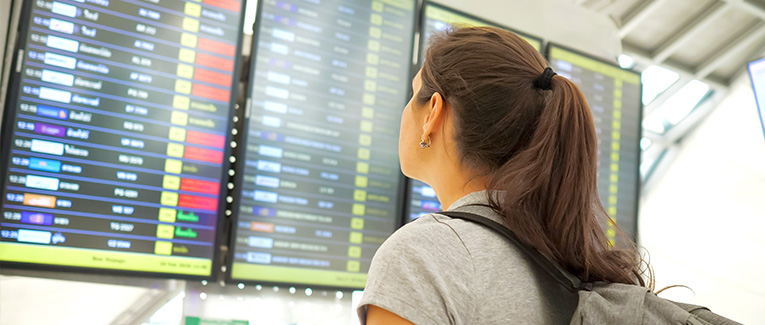
As per the initial F-1 or J-1 status, you can arrive in the U.S. 30 days before your program starts. Coming at the earliest possible time is ideal, but in case you can’t, we recommend arriving at least 15 days in advance. This will allow you time to settle in your dorm, attend the orientation, open a bank account and in general, get used to your new routine.
- Avoiding Jet Lag
Arriving two weeks in advance will give you plenty of time to overcome jet lag. After you arrive in the U.S., do not sleep until bedtime, keep yourself hydrated, and try taking walks. This will help you adjust sooner.
- Get Your Student ID
Go to your university the day you arrive in the U.S. and get your student ID. You will need this ID to access free student services. It will also enable access to every area of the university like the gym, pool, library, etc. Your first student ID card is free, but the university may charge you for a replacement, so, keep it safe.
- Choose Your Accommodations
If you aren’t living on campus, try to find an affordable apartment near your university. This will reduce transportation costs, and also allow you to rest in your apartment during breaks. Ensure that your neighborhood is an area where you feel safe and welcome.
Some apartments provide water and electricity as part of your rent. However, this is not always the case. Many apartments require you to set up these utilities yourself. You can either do this online, or you will be required to do it in person, depending on the area.
You also have to set up your internet services. Having a good internet connection is very important, as you will need it for both academic and personal tasks. Find a plan that works the best for you. On average, your connection should be at least 50 or 60 Mbps.
- Get a Public Transport Pass
If available, look into purchasing a pass for the bus or train in your area. Many public transportation authorities offer a seven-day pass that allows you to take unlimited rides. You can use these seven days to explore the area and become familiar with bus routes. Visit the tourist destinations and familiarize yourself with your surroundings. Locate grocery stores, ATMs, routes to university, etc. before classes start. This is especially useful if your campus is spread across town.
- International Student Orientation
Your university should have a committee of international students that holds an international student orientation to help ease your transition. In this orientation, they’ll inform you about academic expectations, campus life, and visa and immigration policies. You do not want to miss this orientation, as it is a great place to make friends and learn about the campus. Check the dates of this orientation to make sure you arrive in time for it.
- Bank Account
You won’t want to solely rely on your Forex card in the U.S., as it may not be accepted in many places, and you will have to pay conversion charges. It’s better to set up a bank account instead. This will allow you to transfer and receive money, pay bills, and build a credit score that can help you secure loans in the U.S.
Some larger banks may have a policy that requires you to maintain a minimum balance of $5,000. Try finding a local bank instead; they provide the same features as the big banks and may let you open an account free of cost, with no minimum balance.
- Mobile Phone Service
When setting up a new mobile phone, look for a family plan that allows you to make international calls for an affordable rate. With a family plan, you can share the plan with your roommates or friends. This can help you keep phone charges as low as $20 to $25 per month.
- State ID
Many restaurants, bars and clubs in the U.S. require age identification for entry. However, carrying your passport as your sole form of identification in the U.S. can be unsafe, as you could run the risk of losing it. A state ID can serve as identification, and is more convenient to obtain than a driver’s license. All you need to get one is your I-20, passport, and college ID for identification. Go to the state government website and fill out the online form, and you’ll get an appointment to get the ID issued.
- Making friends
Going alone to university on the first day can be nerve-wracking and lonely. Arriving early gives you time to meet new people and make friends. You’ll encounter other international students with whom you can get acquainted and do the abovementioned things together. If lucky, you might even be able to attend some campus events together and meet more people.
If you intend to pick roommates, arriving early is especially important. Sharing the same space with someone you don’t get along with can adversely affect your academics and mental health. Make use of the extra time to get to know a person before you move in with them.
These are the essential things you must do once you arrive in the U.S. Make a list in chronological order to suit your timetable and plan how early you need to arrive. If you’re especially anxious about the transition or have relatives willing to house you, it is best to come 30 days before your program starts.

